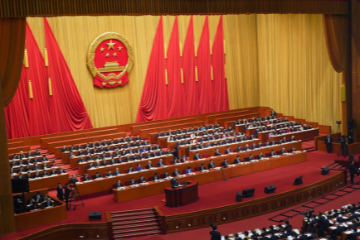
This article is part of the series — What to Expect from International Relations in 2021.
2020 has been the year of much foreign policy introspection in Europe. With the coronavirus crisis, attitudes towards China have taken a decisive, downward turn. Even though Europe breathed a cumulative sigh of relief with Joe Biden’s election, the damage to transatlantic relations under Trump have tempered any hopes of return to old, untroubled times. Strategic autonomy is the new buzzword, as Europeans endlessly debate what it would mean exactly. Still, it has dawned on many that Europe will not just have to assume more responsibility for its own defense and security, but also forge a new foreign policy in response to the challenges 2020 has brought.
One of the biggest challenges for Europe going forward will be forging a China policy. Attitudes towards China in Europe were already hardening on economic matters — questions about state subsidies, intellectual property, Chinese acquisition of strategic infrastructure, shrinking market access in China and a level playing field have been bones of contention for a long time. The coronavirus crisis and China’s mask diplomacy in Europe, crackdowns in Hong Kong and Xinjiang, the border crisis with India, and, most importantly, the recent trade war with Australia have raised alarm bells as Europe has been confronted with an assertive and less willing to compromise China.
One of the biggest challenges for Europe going forward will be forging a China policy.
The good thing is the EU seems to have realised that it needs to be proactive in dealing with China. In the offer presented to the incoming Biden administration, it has highlighted the EU-US bilateral dialogue on China, signaling readiness to work with the US. Many European countries including Germany are also willing to work with the Biden administration in forging a common approach towards China. Many have also realised that the tone the President-elect takes would certainly be different and more conciliatory, but the demands on Europe to do more will not go away.
Another positive sign is that Europe has woken up to the fact that its dependencies on China have grown immensely and it needs to diversify, economically and politically. It is no coincidence that the Indo-Pacific idea has gained so much ground in Europe, coinciding with increasing criticism of China. It is no small feat that Germany, a country with strong economic ties to China, has embraced the concept issuing detailed guidelines on how it hopes to diversify its partnerships in Asia beyond China. Many European countries are also backing the idea that the EU should adopt a similar policy for the region — upgrading from its current Asia strategy.
That economic, security, and technology issues in the Indo-Pacific are increasingly interlinked and developments in this region will have a direct impact on Europe.
The significance of this move does not lie so much in Europe adopting the nomenclature, but in the realisation among many Europeans that debates on China policy are incomplete without taking into account how China behaves in the Indo-Pacific; that the challenges these countries face today, Europe will face tomorrow. That economic, security, and technology issues in the Indo-Pacific are increasingly interlinked and developments in this region will have a direct impact on Europe.
For Europe, to walk the talk on strategic autonomy, it will have to build on these promising trends and deliver quickly in 2021. The EU’s “geopolitical commission” has focused so far on the European Green Deal and its digital strategy. But none of these goals will be achieved so long as the Belt and Road Initiative is setting standards across the rest of the world. If Europe wants to be an effective foreign policy actor or to even achieve its goals internally, it will have to provide alternatives to China — in coronavirus assistance and recovery, infrastructure investments, and technology and supply chains. And in order to achieve these goals, it will have to figure out not just how to work with the US but to also build coalitions with Indo-Pacific partners like Australia, Japan and India.
The views expressed above belong to the author(s). ORF research and analyses now available on Telegram! Click here to access our curated content — blogs, longforms and interviews.




 PREV
PREV

